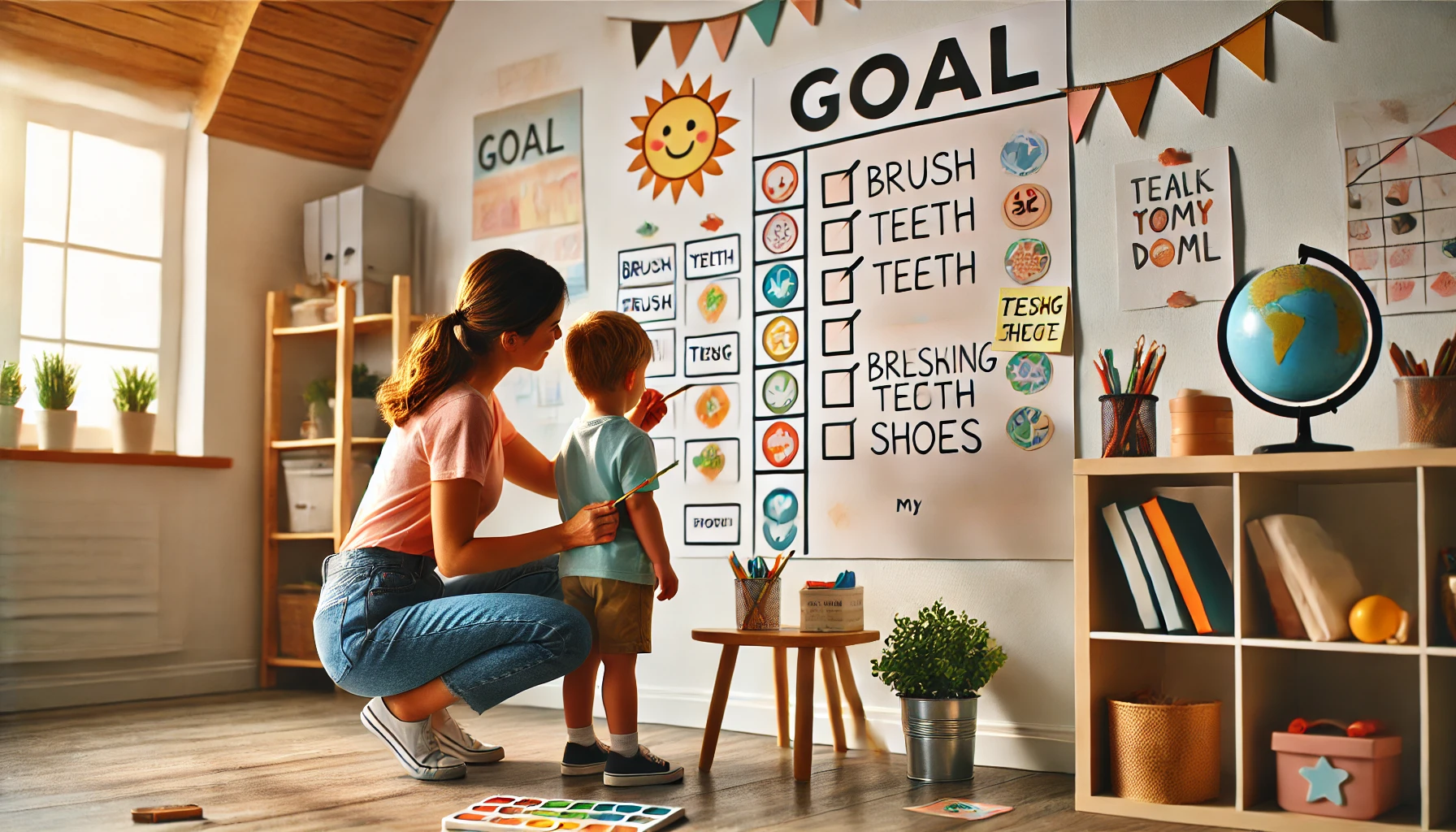Teaching young children how to set and work toward goals helps them develop independence, self-confidence, and motivation. While they may not use the word “goal” themselves, they naturally strive to learn new things—like tying shoes, riding a bike, or writing their name. By guiding their natural curiosity and celebrating progress, parents can help children understand the power of persistence and planning.
Why Goal-Setting Is Important for Kids
- Builds self-esteem and purpose
- Encourages resilience and problem-solving
- Develops focus and planning skills
- Promotes responsibility and follow-through
- Teaches that success comes from effort over time
1. Explain What a Goal Is in Kid-Friendly Language
Start simple with language they understand.
Activity Idea:
- Say: “A goal is something you want to do or learn. You keep trying until you can do it!”
- Give examples: “You wanted to learn to button your shirt—and now you can!”
- Ask: “What’s something new you’d like to try?”
What Kids Learn:
- That goals can be fun and personal.
- How effort leads to success.
- That it’s exciting to try new things.
2. Help Them Choose a Small, Achievable Goal
Early wins build confidence and encourage bigger challenges.
Activity Idea:
- Start with goals like: “Brush my teeth every day this week” or “Learn to zip my coat.”
- Use a goal chart to track progress with stickers or smiley faces.
- Choose one goal at a time to avoid overwhelm.
What Kids Learn:
- How to break goals into small steps.
- That daily effort leads to progress.
- The pride of reaching a milestone.
3. Create a Visual Plan Together
Kids respond well to charts, drawings, and step-by-step plans.
Activity Idea:
- Make a “Goal Ladder” or “Goal Path” with steps to climb toward the goal.
- Let your child decorate it and place it somewhere visible.
- Celebrate each completed step along the way.
What Kids Learn:
- How to stay focused over time.
- That progress is gradual, not instant.
- How to take ownership of the process.
4. Use Encouragement Along the Way
Support and cheer them on, especially during challenges.
Activity Idea:
- Say: “You’re working hard—that’s what matters!”
- Celebrate effort, not just results.
- Use phrases like: “I’m proud of how you keep trying,” or “Let’s keep going together.”
What Kids Learn:
- That persistence is part of success.
- That it’s okay to struggle while learning.
- That their efforts are appreciated.
5. Reflect on Progress Often
Talk about what they’re learning as they work toward the goal.
Activity Idea:
- Ask: “What’s something new you did today to reach your goal?”
- Reflect together at bedtime or during quiet time.
- Celebrate small wins to build momentum.
What Kids Learn:
- How to evaluate their own efforts.
- That reflection deepens learning.
- That growth is something to be proud of.
6. Be a Role Model for Goal-Setting
Show them that goal-setting is for everyone.
Activity Idea:
- Share your own goals: “I’m learning to cook something new this week.”
- Talk about how you work toward your goals each day.
- Let them “coach” or encourage you as you progress.
What Kids Learn:
- That adults also work on goals.
- How to learn from others’ efforts.
- That working toward something is normal and exciting.
7. Celebrate the Outcome—Big or Small
Acknowledging success reinforces the behavior.
Activity Idea:
- Have a mini “goal party” or give a certificate when a goal is completed.
- Say: “You did it! You worked hard and it paid off!”
- Take a photo and add it to a “goal board” to inspire future challenges.
What Kids Learn:
- That success feels meaningful.
- How achievement comes from action.
- That they can do hard things.
8. Start a New Goal When They’re Ready
Keep the momentum going in a positive way.
Activity Idea:
- Ask: “What’s something new you want to try next?”
- Let your child take the lead in choosing.
- Support them with a new visual chart or reminder tool.
What Kids Learn:
- That growth is ongoing.
- How to set personal, meaningful goals.
- That life is full of things to explore and accomplish.
Final Thoughts
Teaching young children about setting goals and working toward them helps them build the skills and confidence they need to thrive. With patience, encouragement, and a little creativity, parents can show kids that they’re capable of achieving great things—one small step at a time.
